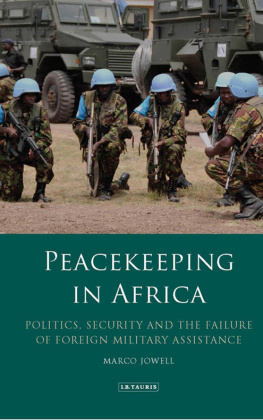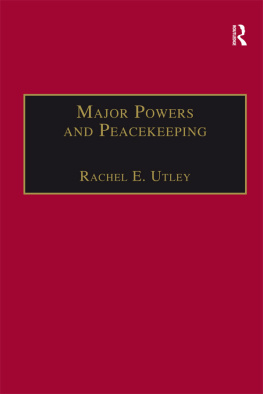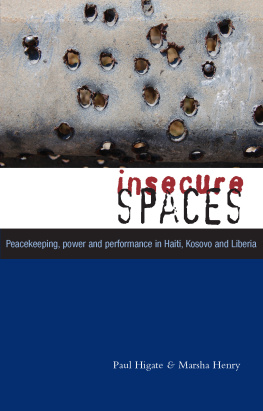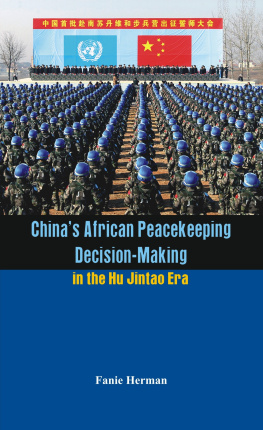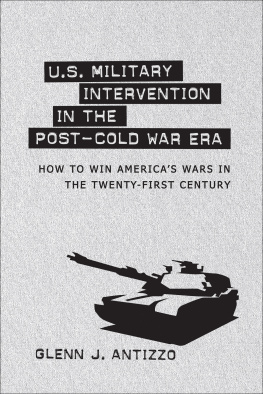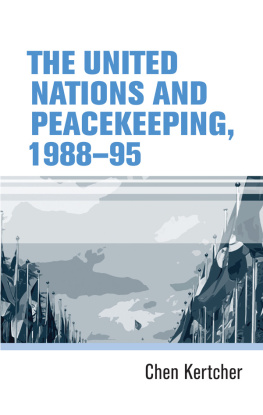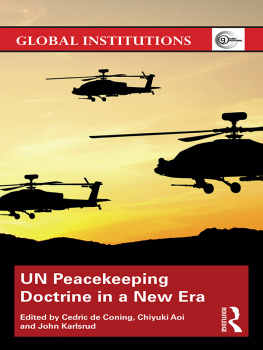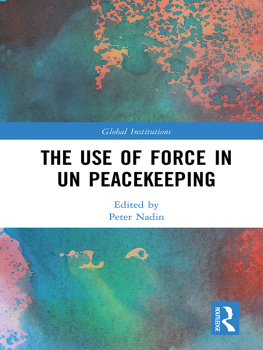MILITARY INTERVENTION AND PEACEKEEPING
By the same author
The War of the Rising Sun and Tumbling Bear - The Russo-Japanese War 1904-5
The Republic of the Ushakovka - Admiral Kolchak and the Allied Intervention in Siberia 1918-20
Military Intervention in the 1990s - New Logic of War
Shrouded Secrets - Japan's War on Mainland Australia 1942-44
Celebration of Victory
The Nature of Future Conflict
Descent into Chaos
MacArthur and Defeat in the Philippines
Military Intervention and Peacekeeping
The reality
Richard Connaughton
Centre for Defence and International Security Studies (CDISS), Lancaster University, UK
First published 2001 by Ashgate Publishing
Reissued 2018 by Routledge
2 Park Square, Milton Park, Abingdon, Oxon, OX14 4RN
711 Third Avenue, New York, NY 10017, USA
Routledge is an imprint of the Taylor & Francis Group, an informa business
Copyright Richard Connaughton 2001
All rights reserved. No part of this book may be reprinted or reproduced or utilised in any form or by any electronic, mechanical, or other means, now known or hereafter invented, including photocopying and recording, or in any information storage or retrieval system, without permission in writing from the publishers.
Notice:
Product or corporate names may be trademarks or registered trademarks, and are used only for identification and explanation without intent to infringe.
Publisher's Note
The publisher has gone to great lengths to ensure the quality of this reprint but points out that some imperfections in the original copies may be apparent.
Disclaimer
The publisher has made every effort to trace copyright holders and welcomes correspondence from those they have been unable to contact.
A Library of Congress record exists under LC control number: 2001094285
ISBN 13: 978-1-138-73691-7 (hbk)
ISBN 13: 978-1-315-18566-8 (ebk)
Contents
- Ambassador Smith Hempstone
- Boutros Boutros-Ghali
- Bill Clinton
This book represents an accretion to my writing and thinking over the past ten years on the subject of military intervention and peacekeeping. The UN Charter makes no provision for peacekeeping and its progress towards finding its niche post-1945 has been ad hoc and largely interest driven, so much so that it has been driven into areas never intended.
To introduce an essential element of order to the concept of collective security it has been necessary to deconstruct what has developed previously under the auspices of UN 'peacekeeping' with a view to producing a new paradigm more appropriate to face today's challenges. This is not an exercise in disparaging the UN. The UN's substantial achievements are acknowledged but so too is the Organisation's far too prevalent habit of entering environments it has neither resources nor expertise to manage.
The first four chapters establish a foundation built upon philosophy, doctrine, definitions, principles and decision-making processes. Having laid out the stall, the new thinking is tested by reference to scenarios drawn from Iraq, Somalia, Rwanda, Kosovo, East Timor and Sierra Leone. It was at Cambridge 1989-90 that I wrote Military Intervention in the 1990s - A New Logic of War, an attempt to establish a collective memory for military intervention in inter- state conflict.
I was in Northern Iraq in 1991 during the conflict there when the reality dawned forcibly upon me that we were witnessing a tectonic shift in our thinking about state sovereignty. We had to think through our attitude to external involvement in intra- state conflict, something which the UN was never established to consider. Unfortunately a new phenomenon emerged on the back of the assumed victory in the Gulf, namely the Peace Profession. Instead of developing a new doctrine relevant to changed circumstances the UN actively encouraged the writing of new doctrine aimed at maintaining the status quo, that is, to continue to relate to relations with states rather than within states. Thus, no longer were traditional peacekeepers' interests confined to monitoring peace lines and peace agreements but they were drawn inexorably into other states' civil wars with what were the forecast devastating consequences.
The UN has to restore its credibility. Only then will the states upon whose support it so vitally depends be prepared to resource that which falls within the realms of possibility. An exercise in public relations between the UN and the USA and its Congress in particular is urgent and overdue. In examining who does what, when and how, this book offers a number of ideas appropriate for a world not as it should be but as it is.
Most of what I have written here has already been rehearsed with people I have met in strange, isolated, sometimes dangerous, inhospitable places throughout the world. The book is founded upon theory and practice. In getting behind the scenes, however, it is particularly intended to explain to a wider audience the conduct of the political and military processes involved in military intervention and peacekeeping. After Iraq, my research continued, taking me into Rwanda, Burundi, Bosnia, Croatia, Kosovo and Sierra Leone, and was supported by targeted study into the UN's operations in Somalia and East Timor. Along the way I was privileged to meet many dedicated, professional, brave people - civilian and military - who gave one hundred per cent to their enterprise. By the same token I also met many who were less impressive.
A work such as this is a synthesis arising from the experience of such encounters. I am no longer certain who would thank me for acknowledging their help and assistance and will therefore resort to the simple expedient of thanking all those who helped me put these thoughts together. They know who they are.
Richard Connaughton
Nettlecombe
June 2001
- ABM Anti-Ballistic Missile
- APC Armoured Personnel Carrier
- ASEAN The Association of South East Asian Nations
- CDS Chief of the Defence Staff
- CEE Central and Eastern Europe
- CENTCOM Central Command (US)
- CIA Central Intelligence Agency
- CIMIC Civil-Military Cooperation
- CJFO Chief of Joint Force Operations
- CJFORT Chief of Joint Force Operational Readiness and Training
- CJO Chief of Joint Operations
- CMOC Civil Military Operations Center
- COS Chief of Staff
- CST Civil Support Team
- DART Disaster Assistance Response Team
- DMZ Demilitarized Zone
- DPKO Department of Peace Keeping Operations
- ECOMOG Ecowas Monitoring Group
- ECOWAS Economic Community of West African States
- ERRF European Rapid Reaction Force
- ESDI European Security and Defence Identity
- ESDP European Security and Defence Policy
- EU European Union
- EUCOM European Command (US)
- FBI Federal Bureau of Investigation
- FCO Foreign and Commonwealth Office
- FEMA Federal Emergency Management Agency
- FINABEL France, Italy, Netherlands, Germany, Belgium, Spain and Luxembourg
- GPS Global Positioning System
- HIC High Intensity Conflict


